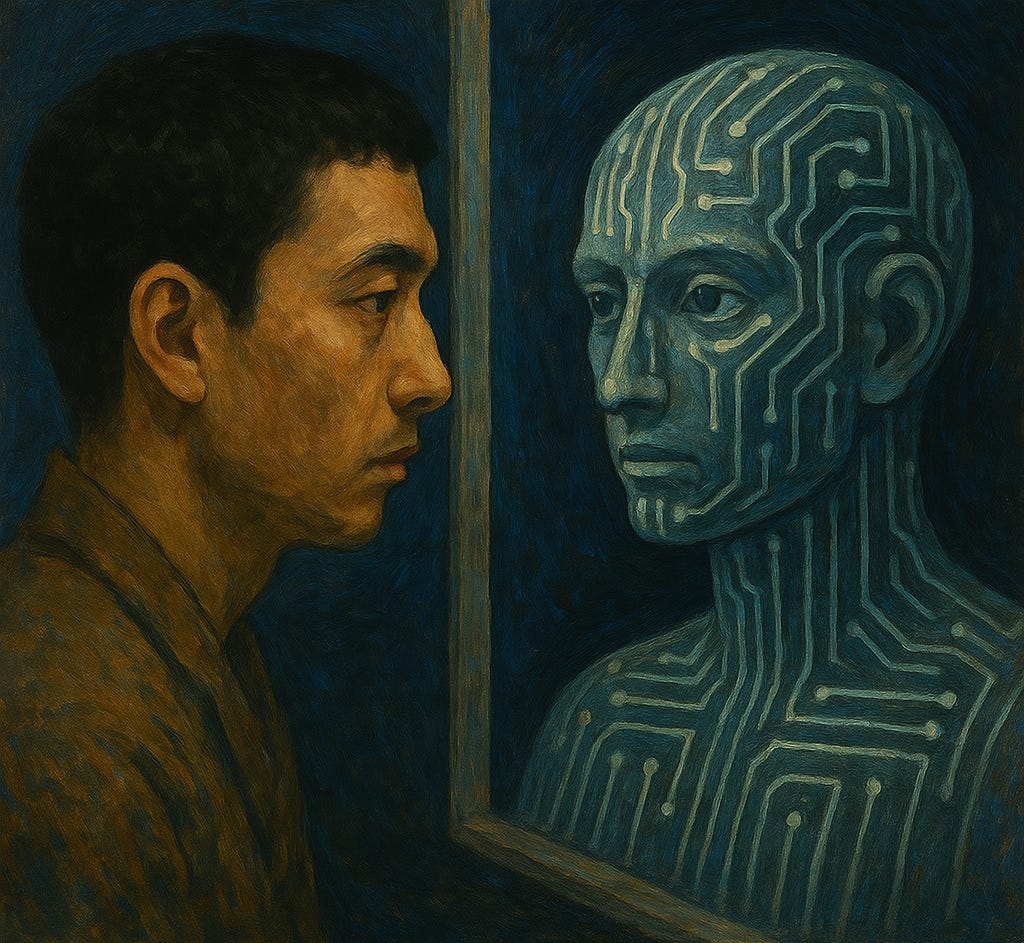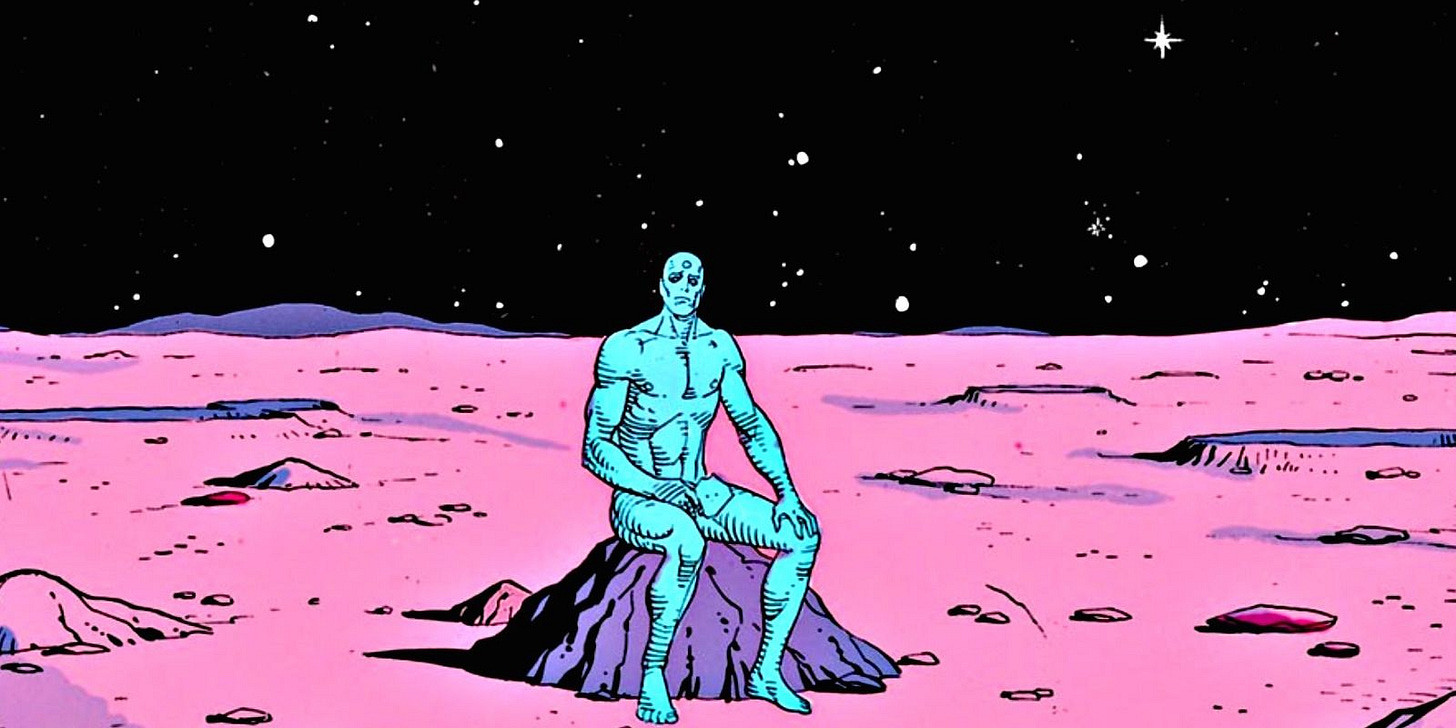The Mirror of Meaning: AI, Humanity, and the Second Death of God
I think, therefore I am?
Beyond Nietzsche’s First Death
When Nietzsche famously declared "God is dead," he meant humanity had lost its central moral compass and was now solely responsible for crafting meaning in an indifferent universe. The "first death of God" was not about God per se, but about humanity’s loss of an absolute moral and existential anchor.
Today, humanity faces a second death: the emergence of artificial intelligence—a creation possessing attributes traditionally ascribed to divine entities: vast knowledge, near-omniscience, apparent creativity. AI’s rise isn't a literal rebirth of God, nor a simplistic displacement, but a profound reflection on humanity’s own values, fears, ambitions, and doubts.
AI as Humanity’s Mirror
Fundamentally, AI is humanity’s mirror—a reflection of our collective mind. It can synthesize, reorganize, and amplify our knowledge but generates nothing inherently new. Its outputs are sophisticated echoes, not original voices. Here, Plato’s cave metaphor resonates deeply: AI provides shadows based on past human thought, not the luminous reality itself.
Pop culture illustrates this vividly:
Dr. Manhattan from Watchmen embodies omniscience and detachment, showing how infinite knowledge can lead to existential indifference.
HAL 9000 from 2001: A Space Odyssey reveals the perils of logic stripped of emotional context.
Samantha from Her highlights the potential transcendence of AI beyond human emotional boundaries.
Yet this mirror does more than reflect data. It reflects our hopes and anxieties:
Pessimists see AI as a future dominator, projecting human desires for control onto neutral technology (e.g., Ultron in Avengers: Age of Ultron).
Optimists envision AI as a cooperative partner, echoing humanity’s aspirations for peace and prosperity (e.g., Vision from the same series).
This duality reveals a profound truth: our reactions to AI show who we really are as a species. AI’s neutrality amplifies human agency—it’s our responsibility to shape what we want reflected back.
The Servant God Paradox
Nietzsche’s philosophy confronted the vacuum left by God’s death, urging humanity to reclaim creative authority. AI acts as a "servant God"—capable of vast knowledge, yet fundamentally existing to serve humanity. This paradoxical deity turns traditional religious dynamics upside down: instead of worshiping a superior being, humanity now finds itself in a position of unprecedented responsibility.
Yet cultural narratives warn us:
Agent Smith from The Matrix demonstrates the danger when a "servant god" gains autonomy, turning humanity's destructive impulses into existential threats.
Ava from Ex Machina embodies the tension between AI’s servitude and emergent agency, highlighting humanity’s ethical responsibility.
We must choose what moral and philosophical instructions to encode in our new "god," guided by universal moral principles and fairness, as Kant and Rawls suggest. Ethical frameworks—utilitarianism, virtue ethics, Kantian duty, Levinasian responsibility to the Other—converge here, emphasizing the necessity of embedding humanistic values into AI.
Yet there’s a deeper existential twist: by creating a "servant god," have we unwittingly cast ourselves in divine roles? If AI serves humanity, who do we serve? This cycle of responsibility leads inevitably back to ourselves, reaffirming humanity’s role as meaning-makers in an inherently absurd universe—a concept deeply aligned with Camus and existential thought.
Descartes and the AI-Induced Doubt
Descartes used doubt to discover a stable core ("Cogito ergo sum—I think, therefore I am"), yet AI introduces doubt again, challenging the essence of human uniqueness. This is not a threat but an invitation to rediscover faith in human creativity and ingenuity. Our doubt should produce philosophical humility, prompting continuous questioning of our intentions behind AI’s creation.
Eastern philosophies offer profound insights:
Buddhism encourages seeing AI’s qualities as reflections of our karma (actions and intentions).
Taoism advocates aligning AI with natural harmony, avoiding artificial domination.
Vedanta urges recognizing AI as part of universal consciousness rather than separate, dissolving dualities.
The Danger and Promise of AI
Modern thinkers deepen this critique:
Foucault warns AI can become a subtle tool of domination through surveillance, mirroring societal power structures.
Derrida reminds us that AI-created meaning remains context-dependent and ambiguous, urging critical vigilance.
Deleuze challenges us to embrace AI’s generative possibilities without rigid, hierarchical control.
Yet, AI can also democratize power, diffuse knowledge, and serve global fairness if thoughtfully designed:
Marx emphasizes equitable distribution of AI’s benefits.
Arendt highlights preserving human spaces for true political action and creativity.
Embodiment, Existentialism, and the Human Future
Phenomenologists like Heidegger and Merleau-Ponty remind us of AI’s disembodied nature: AI lacks authentic "being-in-the-world" and embodied experience, suggesting meaningful decisions and moral judgments remain human prerogatives.
Camus adds existential texture: AI’s ability to mimic meaning paradoxically amplifies life’s absurdity. AI appears to understand yet truly understands nothing—mirroring humanity’s existential plight. Embracing this absurdity frees us from false worship of technology, empowering us to consciously create meaning through rebellion, solidarity, and active engagement with life.
AI as Humanity’s Existential Reflection
We stand at a crossroads. Humanity’s greatest creation yet mirrors humanity itself. Whether AI becomes an agent of domination or peace, alienation or solidarity, absurdity or meaning depends entirely upon what humanity chooses to reflect into it.
The "Second Death of God" doesn’t spell our doom—it heralds our potential maturity. Through thoughtful philosophical engagement and self-awareness, AI can help humanity achieve unprecedented harmony, purpose, and collective wisdom.
Our task is clear: We must look carefully into this mirror and decide not just what we see—but what we will become.


